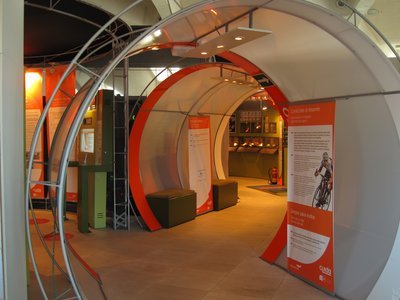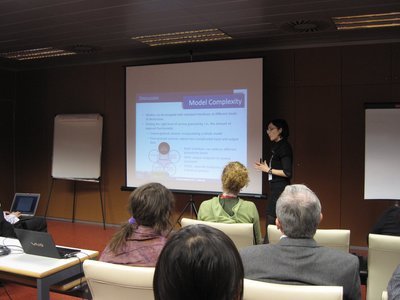ACHI 2020 - The Thirteenth International Conference on Advances in Computer-Human Interactions
November 21, 2020 - November 25, 2020
ACHI 2020: Awards
The papers listed below have been selected as "Best Papers" based on the reviews of the original submission, the camera-ready version, and the presentation during the conference. For the awarded papers, a digital award will be issued in the name of the authors. The authors of these papers are also receiving invitations to submit an extended article version to one of the IARIA Journals.
Note that these articles are selected on the basis of the feedback from the first phase of the conference. Additional articles will be selected from the second phase in November. For details on how the two phase process works, please see the 2020 Procedure.
Awarded Papers
Toward Automated Analysis of Communication Mirroring
Kumiko Hosogoe, Miyu Nakano, Oky Dicky Ardiansyah Prima, Yuta Ono
Simple Generative Adversarial Network to Generate Three-axis Time-series Data for Vibrotactile Displays
Shotaro Agatsuma, Junya Kurogi, Satoshi Saga, Simona Vasilache, Shin Takahashi
Rendering Method of 2-Dimensional Vibration Presentation for Improving Fidelity of Haptic Texture
Junya Kurogi, Satoshi Saga
Human Factors in Exhaustion and Stress of Japanese Nursery Teachers: Evidence from Regression Model on a Novel Dataset
Tran Phuong Thao, Midori Takahashi, Nobuo Shigeta, Mhd Irvan, Toshiyuki Nakata, Rie Shigetomi Yamaguchi
Development of a Wearable Vision Substitution Prototype for Blind and Visually Impaired That Assists in Everyday Conversation
Anna Kushnir, Nicholas H. Müller
Cross-Use of Digital Learning Environments in Higher Education: A Conceptual Analysis Grounded in Common Information Spaces
Diana Saplacan
Designing Personal Health Records for Cognitive Rehabilitation
Klaudia Carcani, Miria Grisot, Harald Holone
The Use of Virtual Reality in Mindfulness Meditation
Gabriela Gorska, Daniel Cnotkowski, Paweł Kobyliński, Cezary Biele
Factors Affecting Motion Sickness in an Augmented Reality Environment
Hwaseung Jeon, Sunyoung Park, Yuryeon Lee, Hyun K. Kim, Muhammad Hussain, Jaehyun Park
Development and Promotion of Educational Materials on Human-Centered Design
Jun Iio, Ayano Ohsaki, Rika Waida
The following papers have been selected on the basis of their contents, specificaly for lending themselves to an interesting extended work. The authors of these papers are receiving invitations to submit an extended article version to one of the IARIA Journals.
Papers Invited for IARIA Journals
An Approach for the Visualization of Crafts and Machine Usage in Virtual Environments
Evropi Stefanidi, Nikolaos Partarakis, Xenophon Zabulis, George Papagiannakis
Usability Testing in the National Information Processing Institute, Poland
Katarzyna Turczyn, Agnieszka Lepianka
Facial Mimicry Training Based on 3D Morphable Face Models
Oky Dicky Ardiansyah Prima, Hisayoshi Ito, Takahiro Tomizawa, Takashi Imabuchi
A Perspective-Corrected Stylus Pen for 3D Interaction
Rintaro Takahashi, Katsuyoshi Hotta, Oky Dicky Ardiansyah Prima, Hisayoshi Ito
The Changing Nature of Childhood Environments: Investigating Children’s Interactions with Digital Voice Assistants in Light of a New Paradigm
Janik Festerling
Decision-making in Game Development Process - A Systematic Review
Regis Batista Perez, Leandro Marques do Nascimento, Alberto de Lima Medeiros, Tiago Beltrão Lacerda
FatCombat: A Health Video Game for Education and Promotion of the Recommended Fat Intake among Children
Ismael Edrein Espinosa-Curiel, Edgar Pozas-Bogarin, Janeth Aguilar-Partida, Maryleidi Hernández-Arvizu, Edwin Emeth Delgado-Pérez
Alarm Sound Classification System in Smartphones for the Deaf and Hard-of-Hearing Using Deep Neural Networks
Yuhki Shiraishi, Takuma Takeda, Akihisa Shitara
Sensor Glove Approach for Japanese Fingerspelling Recognition System Using Convolutional Neural Networks
Tomohiko Tsuchiya, Akihisa Shitara, Fumio Yoneyama, Nobuko Kato, Yuhki Shiraishi
Analysis Method for One-to-one Discussion Process for Research Progress Using Transition Probability of Utterance Types
Seiya Tsuji, Yoko Nishihara, Wataru Sunayama, Ryosuke Yamanishi, Shiho Imashiro
Trust Metrics to Measure Website User Experience
Andréia Rodrigues Casare, Tania Basso, Regina Lúcia de Oliveira Moraes
Towards Context Adaptation in Ubiquitous Applications
Mohamed Sbai, Faouzi Moussa, Hajer Taktak
Detection of Strong and Weak Moments in Cinematic Virtual Reality Narration with the Use of 3D Eye Tracking
Paweł Kobyliński, Grzegorz Pochwatko
Potentials and Challenges of Using Mixed Reality in Mining Education: A Europe-wide Interview Study
Lea Daling, Christopher Eck, Anas Abdelrazeq, Frank Hees
Closing the Loopholes: Categorizing Clients to Fit the Bureaucratic Welfare System
Johanne Svanes Oskarsen
BEACON: A CSCW Tool for Enhancing Co-Located Meetings Through Temporal and Activity Awareness
Ole-Edvard Ørebæk, David Aarlien, Fahad Faisal Said, Karoline Andreassen, Klaudia Carcani
A Simple System for the Complicated Cases? Using Service Design Methods to Visualize Work Practice
Kathinka Olsrud Aspvin, Guri B. Verne
Uses of Interactive Devices such as Artificial Intelligence Solutions for the Improvement of Human-Computer Interactions Through Telemedicine Platforms in France
Bourret Christian, Depeyrot Thérèse
Integrating Human Body MoCaps into Blender using RGB Images
Jordi Sanchez-Riera, Francesc Moreno-Noguer
Being a Reflexive Insider: The Case of Designing Maritime Technology
Yushan Pan
An Analysis of Independent Living Elderly’s Views on Robots: A Descriptive Study from the Norwegian Context
Diana Saplacan, Jo Herstad, Zada Pajalic
Comparison of Input Methods and Button Sizes in Augmented Reality Devices
Sunyoung Park, Yuryeon Lee, Hwaseung Jeon, Hyun K. Kim, Muhammad Hussain, Jaehyun Park
Developing Positive Attitudes Towards Cooperative Problem Solving by Linking Socio-emotional and Cognitive Intentions
Masato Kuno, Yoshimasa Ohmoto, Toyoaki Nishida
Rule-based Intelligent System for Dictating Mathematical Notation in Polish
Agnieszka Bier, Zdzisław Sroczyński
NICER - Aesthetic Image Enhancement with Humans in the Loop
Michael Fischer, Konstantin Kobs, Andreas Hotho
Embodied Conversational Agent for Emotional Recognition Training
Karl Daher, Zeno Bardelli, Jacky Casas, Elena Mugellini, Omar Abou Khaled, Denis Lalanne
3D Virtual Try-On System Using Personalized Avatars: Augmented Walking in the Real World
Yuhan Liu, Yuzhao Liu, Shihui Xu, Jingyi Yuan, Xitong Sun, Kelvin Cheng, Soh Masuko, Jiro Tanaka
Hybrid Control and Game Design for BCI-integrated Action FPS Game
Supachai Tengtrakul, Setha Pan-ngum































